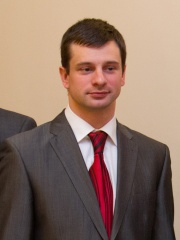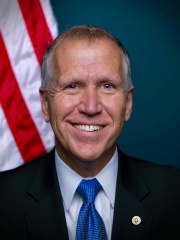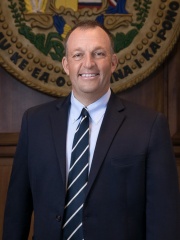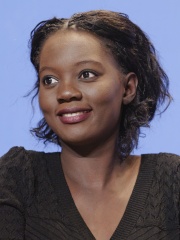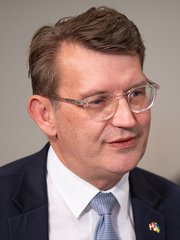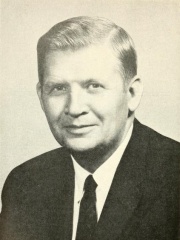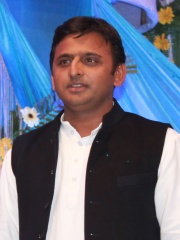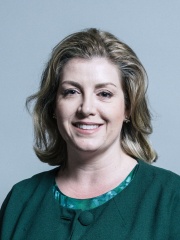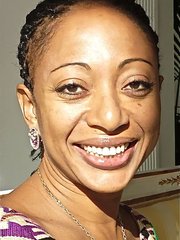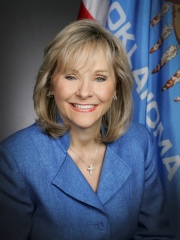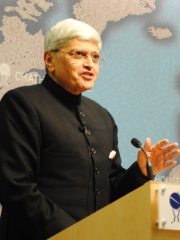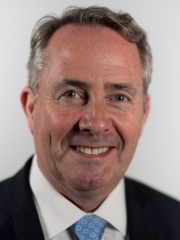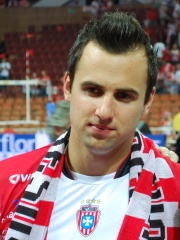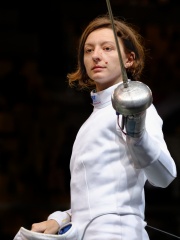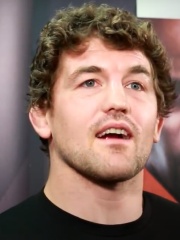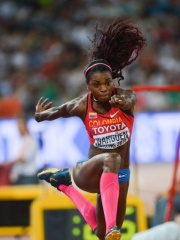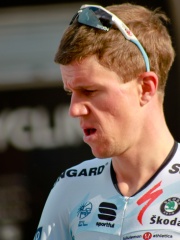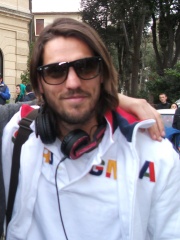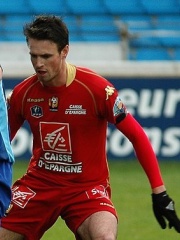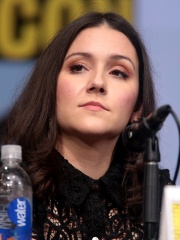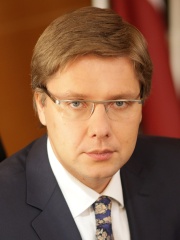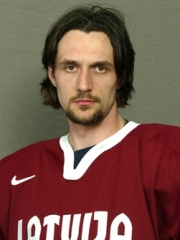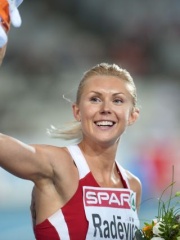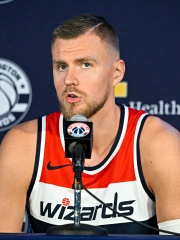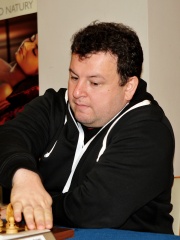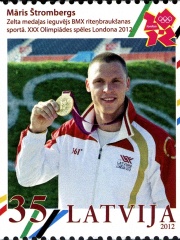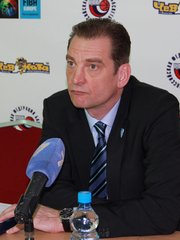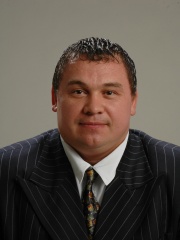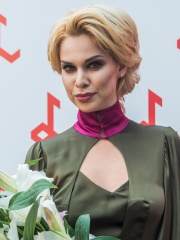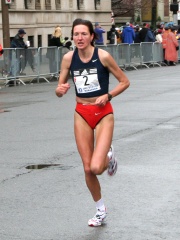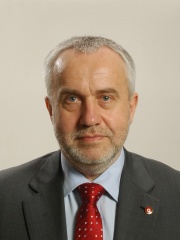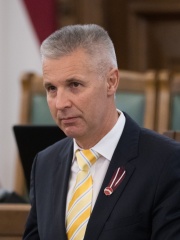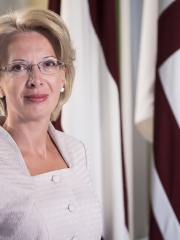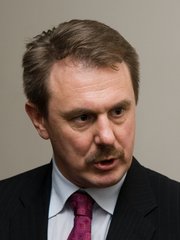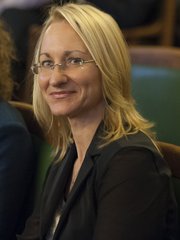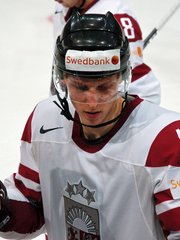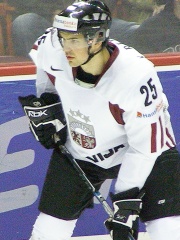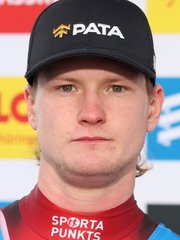POLITICIAN
Martins Dukurs
1984 - Today
 Martins Dukurs
Martins Dukurs
Martins Dukurs (born 31 March 1984) is a former Latvian skeleton racer, currently a coach, who has competed since 1998. He is a six-time world champion in men's skeleton, a double Olympic silver winner (at Vancouver 2010 and Sochi 2014), and the athlete with the most World Cup titles with a total of 11, having won eight consecutive titles between 2010 and 2017, plus another three consecutive titles between 2020 and 2022. Read more on Wikipedia
His biography is available in 26 different languages on Wikipedia (up from 24 in 2024). Martins Dukurs is the 18,880th most popular politician (down from 18,263rd in 2024), the 242nd most popular biography from Latvia (down from 232nd in 2019) and the 58th most popular Latvian Politician.
Memorability Metrics
Page views of Martins Dukurs by language
Among POLITICIANS
Among politicians, Martins Dukurs ranks 18,880 out of 19,576. Before him are Thom Tillis, Lyubov Galkina, Josh Green, Rama Yade, Troels Lund Poulsen, and Terry Sanford. After him are Akhilesh Yadav, Penny Mordaunt, Samia Nkrumah, Mary Fallin, Gopalkrishna Gandhi, and Liam Fox.
Most Popular Politicians in Wikipedia
Go to all RankingsThom Tillis
1960 - Present
HPI: 44.85
Rank: 18,881
Lyubov Galkina
1973 - Present
HPI: 44.84
Rank: 18,882
Josh Green
1970 - Present
HPI: 44.84
Rank: 18,883
Rama Yade
1976 - Present
HPI: 44.84
Rank: 18,884
Troels Lund Poulsen
1976 - Present
HPI: 44.83
Rank: 18,885
Terry Sanford
1917 - 1998
HPI: 44.83
Rank: 18,886
Martins Dukurs
1984 - Present
HPI: 44.83
Rank: 18,887
Akhilesh Yadav
1973 - Present
HPI: 44.82
Rank: 18,888
Penny Mordaunt
1973 - Present
HPI: 44.81
Rank: 18,889
Samia Nkrumah
1960 - Present
HPI: 44.81
Rank: 18,890
Mary Fallin
1954 - Present
HPI: 44.81
Rank: 18,891
Gopalkrishna Gandhi
1945 - Present
HPI: 44.81
Rank: 18,892
Liam Fox
1961 - Present
HPI: 44.81
Rank: 18,893
Contemporaries
Among people born in 1984, Martins Dukurs ranks 551. Before him are György Grozer, Ana Maria Popescu, Ben Askren, Caterine Ibargüen, Chris Anker Sørensen, and Joaquín Larrivey. After him are Julie Engelbrecht, Anthony Le Tallec, Shannon Woodward, Preslava, Damien Perquis, and Maiko Nasu.
Others Born in 1984
Go to all RankingsGyörgy Grozer
VOLLEYBALL PLAYER
1984 - Present
HPI: 44.91
Rank: 545
Ana Maria Popescu
FENCER
1984 - Present
HPI: 44.91
Rank: 546
Ben Askren
MARTIAL ARTS
1984 - Present
HPI: 44.86
Rank: 547
Caterine Ibargüen
ATHLETE
1984 - Present
HPI: 44.84
Rank: 548
Chris Anker Sørensen
CYCLIST
1984 - 2021
HPI: 44.84
Rank: 549
Joaquín Larrivey
SOCCER PLAYER
1984 - Present
HPI: 44.84
Rank: 550
Martins Dukurs
POLITICIAN
1984 - Present
HPI: 44.83
Rank: 551
Julie Engelbrecht
ACTOR
1984 - Present
HPI: 44.81
Rank: 552
Anthony Le Tallec
SOCCER PLAYER
1984 - Present
HPI: 44.80
Rank: 553
Shannon Woodward
ACTOR
1984 - Present
HPI: 44.79
Rank: 554
Preslava
SINGER
1984 - Present
HPI: 44.79
Rank: 555
Damien Perquis
SOCCER PLAYER
1984 - Present
HPI: 44.78
Rank: 556
Maiko Nasu
SOCCER PLAYER
1984 - Present
HPI: 44.74
Rank: 557
In Latvia
Among people born in Latvia, Martins Dukurs ranks 242 out of 323. Before him are Nils Ušakovs (1976), Sergejs Žoltoks (1972), Ineta Radēviča (1981), Kristaps Porziņģis (1995), Daniel Fridman (1976), and Anmary (1980). After him are Māris Štrombergs (1987), Gundars Vētra (1967), Dons (1984), Viktors Ščerbatihs (1974), Samanta Tīna (1989), and Jeļena Prokopčuka (1976).
Others born in Latvia
Go to all RankingsNils Ušakovs
POLITICIAN
1976 - Present
HPI: 45.52
Rank: 236
Sergejs Žoltoks
HOCKEY PLAYER
1972 - 2004
HPI: 45.29
Rank: 237
Ineta Radēviča
ATHLETE
1981 - Present
HPI: 45.26
Rank: 238
Kristaps Porziņģis
BASKETBALL PLAYER
1995 - Present
HPI: 45.07
Rank: 239
Daniel Fridman
POLITICIAN
1976 - Present
HPI: 44.99
Rank: 240
Anmary
SINGER
1980 - Present
HPI: 44.87
Rank: 241
Martins Dukurs
POLITICIAN
1984 - Present
HPI: 44.83
Rank: 242
Māris Štrombergs
CYCLIST
1987 - Present
HPI: 44.67
Rank: 243
Gundars Vētra
BASKETBALL PLAYER
1967 - Present
HPI: 44.66
Rank: 244
Dons
SINGER
1984 - Present
HPI: 44.66
Rank: 245
Viktors Ščerbatihs
ATHLETE
1974 - Present
HPI: 44.54
Rank: 246
Samanta Tīna
SINGER
1989 - Present
HPI: 44.29
Rank: 247
Jeļena Prokopčuka
ATHLETE
1976 - Present
HPI: 44.26
Rank: 248
Among POLITICIANS In Latvia
Among politicians born in Latvia, Martins Dukurs ranks 58. Before him are Andris Šķēle (1958), Artis Pabriks (1966), Ināra Mūrniece (1970), Ģirts Valdis Kristovskis (1962), Nils Ušakovs (1976), and Daniel Fridman (1976). After him are Dace Melbārde (1971), Guntis Galviņš (1986), Krišjānis Rēdlihs (1981), Rodrigo Ābols (1996), and Mārtiņš Bots (1999).
Andris Šķēle
1958 - Present
HPI: 50.38
Rank: 52
Artis Pabriks
1966 - Present
HPI: 48.75
Rank: 53
Ināra Mūrniece
1970 - Present
HPI: 47.73
Rank: 54
Ģirts Valdis Kristovskis
1962 - Present
HPI: 46.84
Rank: 55
Nils Ušakovs
1976 - Present
HPI: 45.52
Rank: 56
Daniel Fridman
1976 - Present
HPI: 44.99
Rank: 57
Martins Dukurs
1984 - Present
HPI: 44.83
Rank: 58
Dace Melbārde
1971 - Present
HPI: 43.18
Rank: 59
Guntis Galviņš
1986 - Present
HPI: 37.32
Rank: 60
Krišjānis Rēdlihs
1981 - Present
HPI: 37.19
Rank: 61
Rodrigo Ābols
1996 - Present
HPI: 34.31
Rank: 62
Mārtiņš Bots
1999 - Present
HPI: 33.03
Rank: 63
